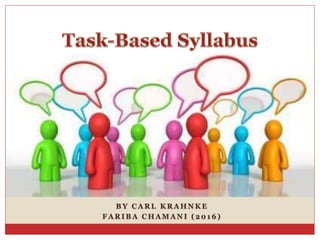
Task based syllabus
- 1. B Y C A R L K R A H N K E F A R I B A C H A M A N I ( 2 0 1 6 )
- 2. Task-Based Content Task-based content uses activities that the learners have to do for non-instructional purposes outside of the classroom as opportunities for language learning. Task-based activities are a way of bringing the real world into the classroom.
- 3. Characteristics of Task Tasks are not static; they should involve a process of informational manipulation and development. They should involve informational content that the language learners do not have at the beginning of the task. They require the student to apply cognitive processes to a combination of new and old information. Language is not taught per se, but is supplied as needed for the completion of the task.
- 4. Characteristics of Task The intent of task-based learning is to use learners' real-life needs and activities as learning experiences, language form is learned through language use. Task-based learning is structurally geared toward language learning or acquisition because the tasks are part of a language learning environment or program.
- 5. Characteristics of Task It fosters language acquisition in the broadest sense by providing maximal amounts of comprehensible input. It does not provide explicit metalinguistic knowledge but if such knowledge is a desired, units or activities focusing on structural content can easily be incorporated into the syllabus.
- 6. Underlying Theories of TBLT The primary theory of learning underlying task- based instruction is Krashen's acquisition theory. The theory of language most closely associated with task-based learning is communicative.
- 7. Selection of Language Tasks Tasks can be selected according to: 1) The students' cognitive and linguistic readiness for particular tasks 2) Their need for the particular discourse Or interactional type 3) Availability of resources for carrying out the tasks
- 8. Sequencing of tasks Sequencing of tasks should follow some of the same criteria as for selection, plus: Shorter and simpler tasks should be undertaken before longer and more complex ones. Tasks requiring known information should come before tasks calling for new information. Tasks calling for existing ability to process information should precede those requiring new types of cognitive processing.
- 9. Tasks for Beginning learners Beginners need short tasks that draw on information they already posses and call for more comprehension than production. Beginners should not have to perform, for example, critical or evaluative tasks if they are not ready for them.
- 10. Tasks for Advanced learners More advanced learners may be ready to handle tasks that: Extend over several days or weeks Call for a great deal of new or unknown information Require complex processing such as evaluation, comparison, integration, and presentation.
- 11. Examples of TB Syllabi Beginning Planning and carrying out a class outing or picnic or dinner Intermediate Writing various types of letters like requests for information, applications, complaints Advanced Doing a price comparison survey of food stores
- 12. Positive Characteristics of TB Syllabi TB instruction is very powerful and widely applicable. It is suitable for learners of all ages and backgrounds. It addresses the crucial problem in language teaching: transfer, directly by using active and real tasks as learning activities. It can be very effective when the learners are engaged in relatively similar out -of-class activities. It can be valuable for learners who have a clear and immediate need to use the language for well-defined purposes. It can be especially useful for learners who are not accustomed to more traditional types of classroom learning or who need to learn cognitive, cultural, and life skills along with the language.
- 13. Negative Characteristics of TB Syllabi Problems of implementing the instruction Requiring a high level of creativity and initiative on the part of the teacher Requiring resources beyond the textbooks and related materials in classrooms Being different from what many students expect Requiring individual and group responsibility on the part of students Being difficult for evaluation
- 14. Applications Task-based learning can be used with learners of all ages backgrounds. Since it depends on comprehensible input, it’s especially applicable in second language teaching setting.
- 15. An example of Task-Based textbooks